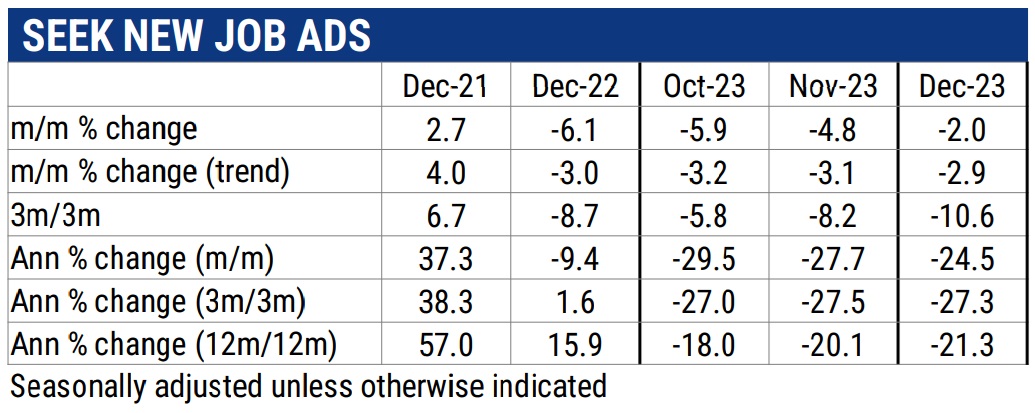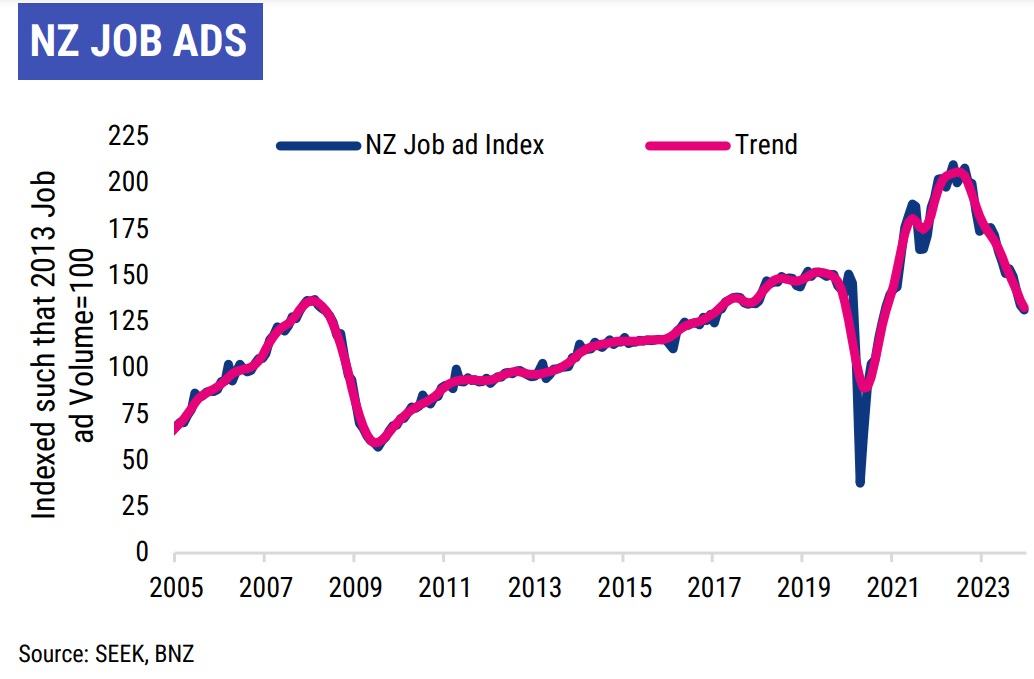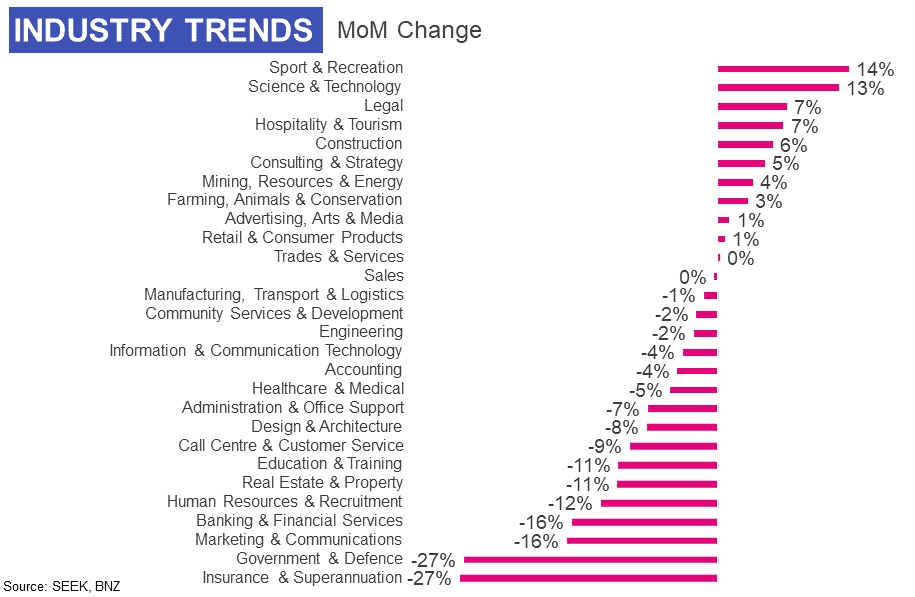
Job ads are continuing to tumble, according to the latest BNZ/SEEK Employment Report.
BNZ's head of research Stephen Toplis says on a seasonally adjusted basis ads have now fallen in 13 of the last 16 months to be 37% down on the peak reported back in August 2022.

"Another way to look at this is that ads are now at their lowest since January 2017, if you exclude the covid lockdown aberration."
Toplis says the drop in ads is a combination of two factors.
"On the one hand weakening economic activity is lowering the marginal demand for labour.
"On the other, huge net migration inflows mean employers are finding labour easier to find. Don’t underestimate the extent of the latter. Net migration inflows are currently at a 76-year high!"
Consistent with the theme of rising supply and diminishing demand, Toplis says job applications to ads have "risen to unprecedented levels".
"This is consistent with the expectation that the recent increase in the unemployment rate will accelerate and wage pressures should diminish."

According to Statistics NZ figures, between the March 2023 and September 2023 quarters the unemployment rate rose from an extremely low 3.4% to 3.9%.
Further rises are expected in coming months.
Toplis says there appear to be two themes running across the job ads data breakdown.
"The government sector is in retreat, and the surge in employment needed to cope with the immediate after-effects of the North Island east coast flooding is now reversing.
"The 6% drop in Wellington job ads in the month, coupled with a 27% decline in government and defence ads, epitomises expectations about cuts in spending by the new government.
"The 9% drop in ads for Hawkes Bay and 13% reduction in Gisborne, accompanied by the 27% fall in insurance and superannuation, surely reflects a reduction in post disaster staffing requirements. On the plus side, Tourism and its associated locale seem to be faring relatively well."

18 Comments
The last piece of the foundation that was propping up the housing market is now starting to break..
Vendors will start running for the hills with no supports left..
Concur.
Compare the 2008 decline with the current decline starting way back when the RBNZ first signaled rate hikes would be harsh.
In 2009 we had the Lehrman collapse and the GFC to reverse high central bank interest rates. High rates preceded GFC by some 12 months or more. If we don't experience something similar soon (a collapse of some sort) I am convinced that central banks will hold rates too high for too long and we'll have a severe global recession to contend with ... All because central bankers don't understand (or have made no attempt to quantify) that high rates compound the effects of economic 'friction'.
https://www.cbsnews.com/news/real-estate-owners-saddled-with-half-empty…
Real estate owners saddled with half-empty office buildings as hybrid work trend continues
"Looking for signs the U.S. economy can continue to stave off a recession? Avert your gaze from commercial real estate. City office buildings are in trouble. For a century, the towers have been propped up by two pillars. One, workers filling the buildings all week. Two, money flowing freely in the form of loans to borrow, buy, and build. Those days are over. As hybrid work hardens from trend to new normal, office occupancy rates have hit all-time lows. Meanwhile interest rates have spiked to historic highs… and now the mortgage comes due: $1.5 trillion in commercial real estate loans expire in the next two years. It's enough to make you rethink the future of cities. We criss-crossed Manhattan, talking to players big and small, about a sector rocked to its foundations."
High rates aren't the problem - they're historically low except for a few lower blips to the extreme - it's the high debt and nowhere to leverage that is the cause of friction. The financialisation of everything has run out of steam. False economics at best.
We didn't learn the last time and instead doubled down.
You're a bit of a one-track pony with a fixation on housing, DGM. You seem to be completely unaware that lower employment will affect many people who are not house owners.
One track pony is better than a jackass like you
Even though you are fixated with high house prices, you dare to point fingers at others.. typical narcissist...
Oops, it seems I hit a nerve there DGM, chill, life is beautiful :-) It's true though, there's more to life than houses, and higher unemployment will affect many people who are not house owners, spare some thoughts for them!
Stop preaching and start practicing
The Household Labor Force survey comes out Feb 7th. Look out for a sharp rise in the underutilisation rates.
How can construction simultaneously having plummeting consents and rising job vacancies?
One, happening for a while, directly leads to the other. No development margin equals no design work equals no consents, equals no construction work. The main issue is people cannot borrow enough to buy the finished price bloated product.
Classic end cycle behaviour. Those carrying the debt of unfinished development generally "get wrecked".
I think you missed Mike's point, Construction is UP 6%, which also really surprised me when we know construction is in a tough spot. Sounds very strange to me too.
Yes at face value it is surprising. But note it’s a month on month measure, these can be volatile
Also as I have said before, there’s still quite a lot of projects in progress, but not so many starting. While there’s still a decent number in progress, there will be jobs. Employees obviously come and go whilst projects are in progress.
Finally, it’s for ‘construction’ broadly, rather than residential construction. And some of this could relate to rebuilding post floods
Good points!
Contractors are dumping their expensive Kiwi labour crews, and rehiring cheaper immigrant labour. They are on casual contracts, so when they finish up a project they just advertise for new workers on even cheaper wages. Rinse and repeat.
Its about time the tail stopped wagging the dog.
Wow, What a surprise!
If you overlay inward migration, filled jobs and benefit claims, you can see the impact of migration really clearly.
New arrivals started arriving in serious numbers in Oct 22. They quickly took the 50,000 - 60,000 jobs that nobody else would take - mainly between Nov 22 and Apr 23. Migration then continued at pace, but job growth didn't (because RBNZ is crushing consumer demand). New arrivals then started to out-compete others for jobs, so benefit claimant numbers started to go up.
What happens next? My view is that migration will slow because the jobs aren't there and people will start going home - and the recession we are demonstrably in will worsen considerably. The counter argument is that all of these extra people will create additional demand in the economy and take us out of recession. I don't see how this can happen while bank credit + Govt stimulus is so low. Where will the extra money come from? Did the 200,000 people arrive with millions of dollars of savings to spend into the economy?
The number of net arrivals into the country since borders opened in August last year stands at 285,592. That's a lot of jobs, houses, rentals, doctors appointments, school enrolments, cars on the road, and carbon emmissions.
You can thank the previous Labour Govt for importing people with absolutely zero care to what happens to the ones already here. Kiwis will pile up on the unemployment benefit (costing taxpayers more money), while employers will continue to hire cheap immigrant labour (even better if they can pay them below minimum rate due to "cashbacks").

We welcome your comments below. If you are not already registered, please register to comment
Remember we welcome robust, respectful and insightful debate. We don't welcome abusive or defamatory comments and will de-register those repeatedly making such comments. Our current comment policy is here.